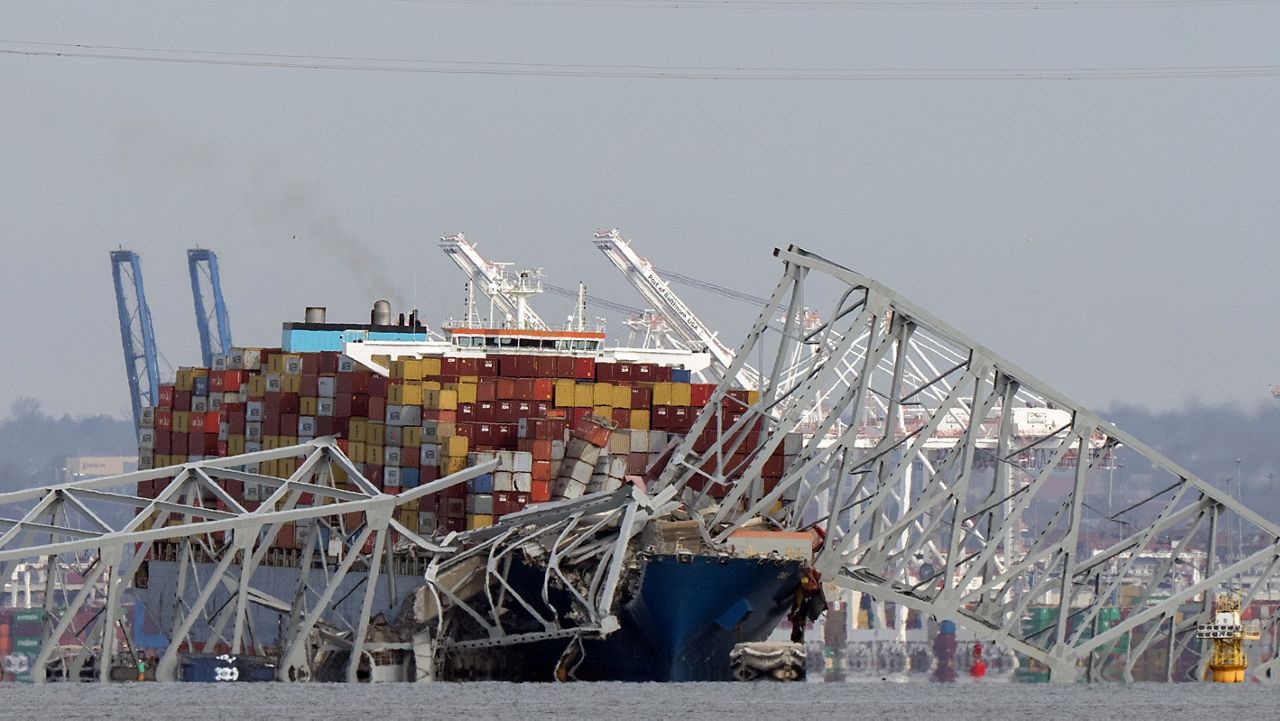The U.S. Coast Guard has opened a temporary, alternate channel for vessels involved in the clearing of debris at the site of the collapsed Francis Scott Key Bridge in Baltimore, part of a phased approach to opening the main channel leading to the vital port, officials said.
Crews are undertaking the complicated work of removing steel and concrete at the site of the bridge's deadly collapse into the Patapsco River after a container ship lost power and crashed into a supporting column. On Sunday, dive teams surveyed parts of the bridge and checked the ship, and workers in lifts used torches to cut above-water parts of the twisted steel superstructure.
Officials said the temporary channel is open only to vessels that are helping with the cleanup effort. Authorities believe four workers plunged to their deaths in the collapse.
Maryland Gov. Wes Moore said at a Monday afternoon news conference that his top priority is recovering the four bodies, followed by reopening shipping channels to the port. He said he understands the urgency but that the risks are significant because of the mangled steel of the fallen bridge that crews have described as "chaotic wreckage."
"We have to move fast, but we cannot be careless," he said.
U.S. Coast Guard Rear Admiral Shannon Gilreath said divers examining the steel girders beneath the surface found that the steel is tangled and intertwined, making it difficult to figure out where they can be cut to make them manageable to lift out of the water.
"What we're finding is it is more complicated than we hoped for initially," Gilreath said.
Moore said crews used a large crane to cut up and lift a 200-ton span of the bridge, a task that took 10 hours. He said the piece was considered a "relatively small lift."
"The scale of this project, to be clear, it is enormous, and even the small lifts are huge," he said.
Moore said crews will lift another 350-ton piece from the bridge later Monday as weather allows.
Officials earlier said the temporary channel would have a controlling depth of 11 feet, a horizontal clearance of 264 feet and a vertical clearance of 96 feet. A video released Sunday showed the Coast Guard dropping buoys in the water.
"This marks an important first step along the road to reopening the port of Baltimore," Capt. David O'Connell, the federal on-scene coordinator of the response, said in a statement Monday. "By opening this alternate route, we will support the flow of marine traffic into Baltimore."
President Joe Biden will visit the site Friday, White House press secretary Karine Jean-Pierre announced Monday afternoon. He will meet with state and local officials and get an "on-the-ground look" at federal response efforts, Jean-Pierre said.
Also Monday, the Small Business Administration opened two centers in the area to help companies get loans to assist them with losses caused by the disruption of the bridge collapse. One of the centers is in Dundalk, a suburb of Baltimore on the northeast end of the bridge.
Yvette Jeffery, a spokesperson for the agency's disaster recovery office, said affected businesses can receive loans for as much as $2 million. She said the effects could range from supply-chain challenges to decreased foot traffic in communities that depended heavily on the bridge.
The bridge fell as the crew of the cargo ship Dali lost power and control on March 26. They called in a mayday, which allowed just enough time for police to stop vehicles from getting on the bridge, but not enough time to get a crew of eight workers off the structure.
Two workers survived, two bodies were found in a submerged pickup, and four more men are presumed dead. Weather conditions and the tangled debris underwater have made it too dangerous for divers to search for their bodies.
The Dali is managed by Synergy Marine Group and owned by Grace Ocean Private Ltd., both of Singapore. Danish shipping giant Maersk chartered the Dali, which was on its way out of port when it lost power.
Synergy and Grace Ocean filed a court petition Monday seeking to limit their legal liability. It is a routine but important procedure for cases litigated under U.S. maritime law. A federal court in Maryland will ultimately decide who is responsible and how much they owe.
The filing seeks to cap the companies' liability at roughly $43.6 million. It estimates that the vessel itself is valued at up to $90 million and was carrying freight worth over $1.1 million in income for the companies. The estimate also deducts two major expenses: at least $28 million in repairs and at least $19.5 million in salvage.
Along with clearing the shipping channel to reopen the port, officials are trying to determine how to rebuild the major bridge, which was completed in 1977. It carried Interstate 695 around southeast Baltimore and became a symbol of the city's working-class roots and maritime culture.
Congress is expected to consider aid packages to help people who lose jobs or businesses because of the prolonged closure of the Port of Baltimore. The port handles more cars and farm equipment than any other U.S. facility.



